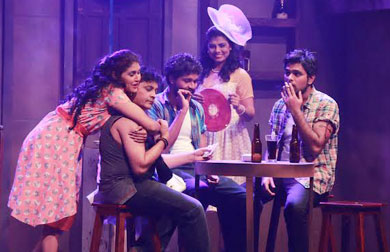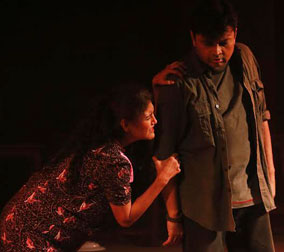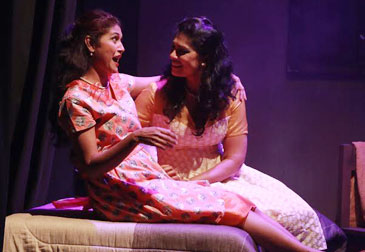A
'desire' laudably translated
A review of the Sinhala play Ashave Veedi-Riya:
by Dilshan Boange
 Works of US playwright Tennessee Williams, translated and adapted to
suit the local flavour have found favourable reception among Sinhala
theatregoers over the decades. Among these are The Glass Menagerie
translated as Ahas Maliga (which translates to castles/palaces in the
sky), by the late Henry Jayasena and 'Cat on the Hot Tin Roof' as Heley
Negga Dong Putha by the late Sugathapala de Silva and a Sinhala
adaptation of 'A Streetcar Named Desire' as Ves Muhunu (masks) by the
late Dhamma Jagoda. Works of US playwright Tennessee Williams, translated and adapted to
suit the local flavour have found favourable reception among Sinhala
theatregoers over the decades. Among these are The Glass Menagerie
translated as Ahas Maliga (which translates to castles/palaces in the
sky), by the late Henry Jayasena and 'Cat on the Hot Tin Roof' as Heley
Negga Dong Putha by the late Sugathapala de Silva and a Sinhala
adaptation of 'A Streetcar Named Desire' as Ves Muhunu (masks) by the
late Dhamma Jagoda.
Last month, I saw the first ever production of a Sinhala translation
of 'A Streetcar Named Desire' come to life in the auditorium of the
British School in Colombo. Translated, directed, and produced by Champa
Mahawedage, the drama was titled Ashave Veedi-Riya. Very much a verbatim
translation of the English title one might think, although I would say a
more precise verbatim translation would have made it Ashava Nemethi
Veedi-Riya. However, for the purpose of 'dialectic functionality' within
the play, I can quite well see why it was entitled as it was. If Chamila
Peiris playing Blanche Dubois uttered Ashava nemethi veedi-riya it would
have sounded quite literary and contrived as opposed to normal speech.
Sinhala is a very rich and colourful language and quite arguably
outdoes English when it comes to 'layers' for variance between literary,
erudite speech and colloquial dialogue. Ashave Veedi-Riya as a
translation certainly had subtle layering to denote distance between the
classes of different characters, like for example between Blanche Dubois
and Stanley Kowalski. However, the mix of certain doses of Sinhala
vocabulary of a more literariness with colloquialism as was seen at the
opening dialogue between the two 'ghetto girls' where the word
sarvangaya (whole body) was used instead of a more colloquial Sinhala
word, seemed a bit odd to me.
Translation
 On
what Mahawedage offered as a Sinhala translation I would like to further
comment that Williams' script features the word Polak (a distortion of
the word Pole) used by Blanche to unflatteringly refer to her
brother-in-law Stanley's Polish origins. Mahawedage's translation used
the word Polantha jathikayek which means a Polish national or Pole and
misses Blanche's intended slur with Polak. In my opinion a word like
Polantha kaaraya or something even more innovatively twisted like 'Polanthakayaa'
or Polanthayaa would have been more colloquially apt to contextualise
and project the purpose and essence behind the term Polak. On
what Mahawedage offered as a Sinhala translation I would like to further
comment that Williams' script features the word Polak (a distortion of
the word Pole) used by Blanche to unflatteringly refer to her
brother-in-law Stanley's Polish origins. Mahawedage's translation used
the word Polantha jathikayek which means a Polish national or Pole and
misses Blanche's intended slur with Polak. In my opinion a word like
Polantha kaaraya or something even more innovatively twisted like 'Polanthakayaa'
or Polanthayaa would have been more colloquially apt to contextualise
and project the purpose and essence behind the term Polak.
The stage set and design were very well done. The lighting was
commendably executed and deserves mention. The stagecraft was notably
complemented by the handling of lighting to drive the narrative from a
point of spatial dimension demarcation through light as apart from the
spaces demarcated by the stage set. The audio aspect of the production,
which gained much in the form of recorded jazz music and live piano
music by Harsha Makalande, and sound effects played over the sound
system that amplified the acts of domestic violence such as breaking
plates and glasses, must be applauded as elements that heightened the
'theatre experience'.
Although I have no complaints regarding the theatre production there
is however a matter for which the producer must be chastised with regard
to a constant disturbance that was set in place during the show. The
performance was made an opportunity for a photo shoot with no less than
three designated photographers stationed in the audience. The constant
camera clicking was audible and unforgivable and showed blatant
disrespect on the part of the producer to 'discerning viewership'.
On the matter of acting, in general, 'symmetry of acting talent' was
visible from the talent on stage. Janaka Kumbukage as Stanley deftly
manoeuvred the outburst and growls and the overall menace of the
character in a way that made his aggression's velocity well timed and
skilfully fluctuated. His performance was dynamite. Chamila Peiris too
must be commended for her performance, which was convincing from start
to finish. And Gayani Hansika and Sumith Rathnayake who played Stella
and Mitch respectively too deserve commendation along with the rest of
the cast for a worthy performance.
Corrupt
 The
story is centralised on the pitiful plight of Blanche Dubois. The
character and her story must be looked at with regard to how aspects of
her past have led to her mental imbalance, which although concealed at
first surfaces when events turn unsavoury. However, in Mahawedage's
production Blanche's character was projected mostly as a perverted,
morally corrupt sinner to the extent the expression of acting by both
Chamila Peiris and her co-actors left her mental neurosis factor
somewhat 'underdeveloped'. Did Blanche become psychotic because of her
sexual misdemeanours or was it her psychologically underlying neurosis
heightened by financial insecurity and that drove her to seek the
protection of men and delude herself with constant escapism after losing
her family wealth and privilege? This is perhaps a line of inquiry that
needs to be better investigated with regard to how the character is
projected through actors' expressions and overall interplay between
characters. The
story is centralised on the pitiful plight of Blanche Dubois. The
character and her story must be looked at with regard to how aspects of
her past have led to her mental imbalance, which although concealed at
first surfaces when events turn unsavoury. However, in Mahawedage's
production Blanche's character was projected mostly as a perverted,
morally corrupt sinner to the extent the expression of acting by both
Chamila Peiris and her co-actors left her mental neurosis factor
somewhat 'underdeveloped'. Did Blanche become psychotic because of her
sexual misdemeanours or was it her psychologically underlying neurosis
heightened by financial insecurity and that drove her to seek the
protection of men and delude herself with constant escapism after losing
her family wealth and privilege? This is perhaps a line of inquiry that
needs to be better investigated with regard to how the character is
projected through actors' expressions and overall interplay between
characters.
What is the relevance of the title to the story? 'A Streetcar Named
Desire' can very well be a metaphor for the central character - Blanche.
A streetcar/tram is a public transportation vehicle that all and
sundry ride but no one hangs on to or owns personally. Blanche who is
soaked with immense 'desire' unfulfilled is an embodiment of that title.
In that sense the decision with regard to how the title was translated
to Sinhala suits the overall purpose well.
A translation cannot change the cultural milieu shown by the original
story and impose 'adapted elements' in order to make it feel more
'closer to home'. In this case as the translator Mahawedage has done
justice to the original English script. Overall as a Sinhala translation
and as a performance Ashave Veedi-Riya can be applauded as a triumph. |

